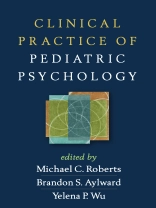Filled with vivid clinical material, this book describes effective practices for helping children and their families who are coping with chronic and acute health conditions and their treatment. Concise chapters on the psychosocial challenges associated with specific pediatric health conditions are organized around detailed case presentations. Demonstrating procedures for assessment, case conceptualization, brief intervention, and health promotion, the book highlights ways to collaborate successfully with medical providers and families. Chapters also discuss the varied roles that pediatric psychologists play in hospitals, outpatient clinics, primary care, and educational settings.
See also Handbook of Pediatric Psychology, Fourth Edition, edited by Michael C. Roberts and Ric G. Steele, which comprehensively examines links between psychological and medical issues from infancy through adolescence.
สารบัญ
I. Overview and Foundations of Pediatric Psychology
1. Overview of the Field of Pediatric Psychology, Michael C. Roberts, Brandon S. Aylward, and Yelena P. Wu
2. Common Presenting Concerns and Settings for Pediatric Psychology Practice, Stephen Lassen, Yelena P. Wu, and Michael C. Roberts
3. Cross-Cutting Issues in Pediatric Psychology, Yelena P. Wu, Brandon S. Aylward, and Michael C. Roberts
4. Financial and Organizational Issues of Pediatric Psychology Practice, Christina L. Duncan and Allison G. Dempsey
II. Clinical Roles in Pediatric Psychology
5. Pediatric Consultation-Liaison: The Psychological Hospitalist, Bryan D. Carter, Suzanne M. Thompson, and Aimee N. Thompson
6. Pediatric Psychology Practice in Primary Care Settings, Terry Stancin, Lynne Sturm, and Lisa Y. Ramirez
7. Pediatric Multidisciplinary and Interdisciplinary Teams and Interventions, Caitlin Conroy and Deirdre E. Logan
8. School Reintegration: Providing Consultation to Schools and Families, Melissa A. Alderfer and Mary T. Rourke
9. The Role of Pediatric Psychology in Health Promotion and Injury Prevention, Keri J. Brown Kirschman and Bryan T. Karazsia
10. The Use of Technology in Pediatric Psychology Practice, Brandon S. Aylward, Christopher C. Cushing, and Timothy D. Nelson
III. Pediatric Conditions and the Role of the Psychologist
11. Infants Born Prematurely and/or at Biological Risk, Glen P. Aylward
12. Pediatric Procedural Pain, Elizabeth N. Mc Laughlin and Joanne M. Gillespie
13. Pediatric Chronic and Episodic Pain, Anne M. Lynch-Jordan
14. Pediatric Sleep Disorders, Jodi A. Mindell and Lisa J. Meltzer
15. Juvenile Idiopathic Arthritis, Catherine Butz, Kathleen Lemanek, and Cynthia A. Gerhardt
16. Pediatric Human Immunodeficiency Virus, Jerilynn Radcliffe, Linda A. Hawkins and Cindy L. Buchanan
17. Pediatric Asthma, Barbara Jandasek and David A. Fedele
18. Pediatric Diabetes, Lisa M. Buckloh
19. Pediatric Obesity, Christopher C. Cushing, Kelsey Borner, and Ric G. Steele
20. Pediatric Cancer, Lauren C. Daniel, Matthew C. Hocking, and Lamia P. Barakat
21. Pediatric Seizure Disorders, Avani C. Modi and Shanna M. Guilfoyle
22. Pediatric Organ Transplantation, Rebecca J. Johnson
23. Pediatric Feeding Disorders, Loretta A. Martin-Halpine
24. Pediatric Elimination Disorders, Susana R. Patton and Martha U. Barnard
25. Pediatric Traumatic Brain Injury, Shari L. Wade
26. End of Life in the Pediatric Population, Victoria W. Willard, Valerie Mc Laughlin Crabtree, and Sean Phipps
เกี่ยวกับผู้แต่ง
Michael C. Roberts, Ph D, ABPP, is Professor and former Director of the Clinical Child Psychology Program at the University of Kansas. He has published close to 200 journal articles and book chapters related to understanding and influencing children’s physical and mental health. Dr. Roberts has authored or coedited 18 books, including Handbook of Pediatric Psychology, Fourth Edition, and is currently the Editor of Training and Education in Professional Psychology. He is a recipient of the Award for Distinguished Contributions to Education and Training from the American Psychological Association and the Martin P. Levin Mentorship Award from the Society of Pediatric Psychology.
Brandon S. Aylward, Ph D, is Assistant Professor of Pediatrics at Emory University School of Medicine and a researcher in the Sibley Heart Center and Division of Pediatric Neurology at Children’s Healthcare of Atlanta. He received his doctorate in Clinical Child Psychology from the University of Kansas. Dr. Aylward has published journal articles and book chapters in the areas of pediatric psychology, analytic methods, and health technology, and serves on the editorial boards of several journals. He is currently engaged in multidisciplinary clinics focusing on pediatric cardiology, neurodevelopmental outcomes, and self-management/adherence. He is a recipient of the C. Eugene Walker Education Award from the Society of Pediatric Psychology.
Yelena P. Wu, Ph D, is Assistant Professor in the Department of Family and Preventive Medicine and Investigator at the Huntsman Cancer Institute at the University of Utah. She received her doctorate in Clinical Child Psychology from the University of Kansas. Her research interests include identifying risk and protective factors influencing pediatric medical regimen adherence and health outcomes, and dissemination of empirically based assessments and interventions for adherence. Dr. Wu has published numerous articles and book chapters on psychosocial and health outcomes among individuals with chronic conditions across the lifespan. She is a recipient of the C. Eugene Walker Education Award from the Society of Pediatric Psychology.












